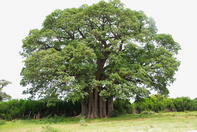The iconic Baobab Tree (Adansonia digitata) is a familiar site in hot, dry lowland areas of Africa, Madagascar, India, Sri Lanka and Australia.

Resembling an ‘upside down tree' (also referring to its common name), with the branches looking like roots, the huge tree's trunk can reach a circumference of up to 25 m. These long-lived deciduous fruit trees easily grow to over 1 000 years of age.
Its white drooping flowers flowering from October to December are pollinated by bats and produce oval fruit with a hard shell encasing a powdery fruit mass and oil-rich seeds.
The fruit - up 12 cm long - dry on the trees and fall to the ground where it is harvested. It is estimated that it takes 8 to 23 years before the baobab can produce seeds and the mature plant can produce more than 30 kg of fruits.
Baobabs can be propagated from seeds as well as vegetatively or by transplanting naturally generated seedlings. The tree grows in semi-arid to subtropical zones but are very sensitive to frost. Baobabs are hosts to mealybugs which are vectors of virus diseases of cocoa.
Benefits of Baobab and Baobab Oil
Baobab provides food, water and fibre but also have medicinal uses. Young leaves are used in cooking or to treat fever. The stringy fibres of the bark are used to make ropes, paper and are woven into fabrics while emergency water is retrieved from the branches and trunk.
powdery fruit mass is a natural source of calcium (Ca), contains magnesium (Mg), potassium (K) and B-complex vitamins and makes a drink high in vitamin C.
Gently scented and semi-liquid, baobab oil is edible, but is mainly used in the cosmetic industry. The oil has saturated, monounsaturated and polyunsaturated fatty acids with a omega-6 content of around 30%. A compound in the oil (β–sitosterol) is a very strong antioxidant that may reduce DNA damage in cells.
Baobab oil contains vitamins A (renews cell membranes), D3, K and E. Baobab oil is mostly cold-extracted and makes a good massage oil that is quickly absorbed.
The oil is traditionally used to heal swollen, inflamed gums, but can benefit dry frizzy hair, treat chapped lips, is used as a skin moisturiser and to treat stretch marks by stimulating collagen formation. Its soothing properties are helpful for eczema and psoriasis treatments and it is known to restore and re-moisturize the epidermis.
Medical Disclaimer
Information is for educational and informational purposes only and may not be construed as medical advice. The information is not intended to replace medical advice or treatment offered by healthcare professionals.
By Marinda Louw
For bulk or Baobab export enquiries please use the enquiry link below.